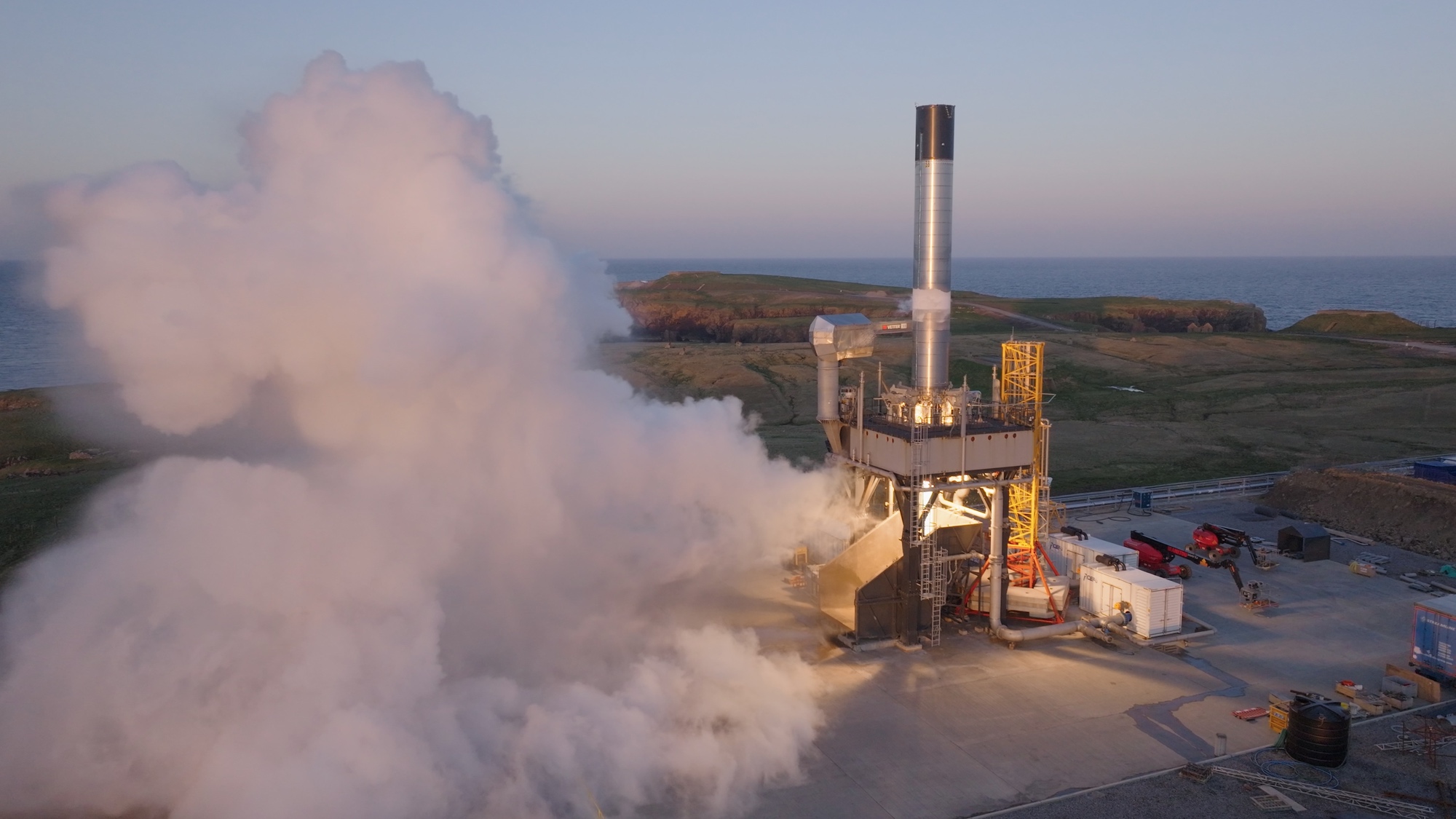Products You May Like
WASHINGTON — Rocket Factory Augsburg (RFA) is “a matter of weeks” away from attempting its first orbital launch, according to the chief executive of its corporate parent.
In an earnings call Aug. 8 to cover the company’s financial results for the first half of 2024, OHB Chief Executive Marco Fuchs said preparations were going well for the inaugural launch of the RFA ONE rocket from SaxaVord Spaceport in the Shetland Islands. OHB owns nearly 65% of RFA.
“What is really imminent is the full integration of the launcher and also, in a matter of weeks, a launch attempt. We’ll see when exactly this will take place,” he said on the call.
He noted that all three stages of the rocket as well as its payloads are now at the spaceport, with the second stage and kick stage already fully tested. The first stage has undergone static-fire tests with four of its nine engines there. All nine engines are now installed, Fuchs said, and static-fire tests with all nine are pending.
RFA itself has not disclosed a projected date for the first launch. Scott Hammond, deputy chief executive and operations director of SaxaVord Spaceport, said in a presentation at the Farnborough International Airshow in July that the launch was planned for the third quarter, but suggested it could slip. In a separate interview at the show, Matthew Archer, director of launch at the U.K. Space Agency, said he expected the launch to take place “towards the back end of autumn” based on when the spaceport’s range capabilities will be in place.
Fuchs sought to “manage expectations” about the first flight of RFA ONE, a vehicle designed to place up to 1,300 kilograms into sun-synchronous orbit. “Rocket science is rocket science,” he said. “Nobody knows how far the rocket literally will fly on this first launch attempt, but we see this first launch attempt coming sooner than later.”
Waiting on Belgium
The earnings call took place one year and one day after OHB announced a deal with investment firm KKR that would effectively take the company private, with KKR agreeing to buy nearly all the shares in the company not held by the Fuchs family.
That deal has not closed, even after Fuchs said in May that he expected the deal to be finalized by the end of June. The final obstacle, he said in the latest earnings call, was getting approval from Belgium.
Fuchs blamed the delay on a late start by Belgian regulators on approving the deal. “Belgium only really started doing this process after they saw that Germany approved,” he said. The German government approved the deal in May and other European countries had approved it earlier.
He also suggested “changes to their processes recently” by the Belgian government contributed to the delay, but remained optimistic that OHB would secure an approval soon. “The latest news that we got in the last days is that this is on a very good way and supposedly it’s about to close in the next couple of weeks.”
OHB has until Sept. 30 to close the deal with KKR, when the stock offer expires. “Provided that this regulatory process is moving in the days and weeks, as we are assuming it will, we are expecting there will be a closing.”
IRIS² update
The company also provided insights on the status of the European Union’s Infrastructure for Resilience, Interconnectivity and Security by Satellite (IRIS²) constellation. The European Commission announced in April that it was still evaluating the proposal offered by a consortium of major European space companies for IRIS², with no firm schedule for finalizing a contract.
OHB is not a formal member of the industry consortium bidding on the project, said Markus Moeller, OHB’s chief strategy and business development officer, on the earnings call. The company is instead a “core team member” that is a supplier to the consortium partners.
In recent weeks, two of the consortium members, Airbus Defence and Space and Thales Alenia Space, have reportedly sought to leave the consortium. Moeller said OHB “does not fully understand” why those companies are pulling out but believed it had to do with risks associated with the project. The companies would remain, like OHB, suppliers to the consortium.
The remaining companies of the consortium are working on a “La BAFO,” or last best and final offer, due to the European Commission Sept. 2, he said. That would not change OHB’s role in IRIS² although he said changes to other parts of the multi-orbit constellation had increased its costs to around 12 billion euros, roughly double earlier estimates.
“I think there is, absolutely, a true intent by the commission to get this program though,” he said. He expected the European Commission, after receiving the proposal, to give either a full award to work on the program or a six-month interim award “to adjust the offer based on real work.”
That interim award, Moeller added, would be required if the commission does not make a full award this year to keep IRIS² on schedule. “If the commission still wants to fly in 2028 with the MEO part,” he said, referring to satellites in medium Earth orbit, “then we have to start by the end of this year in terms of contracting or there’s no way they’ll be in space by 2028.”
